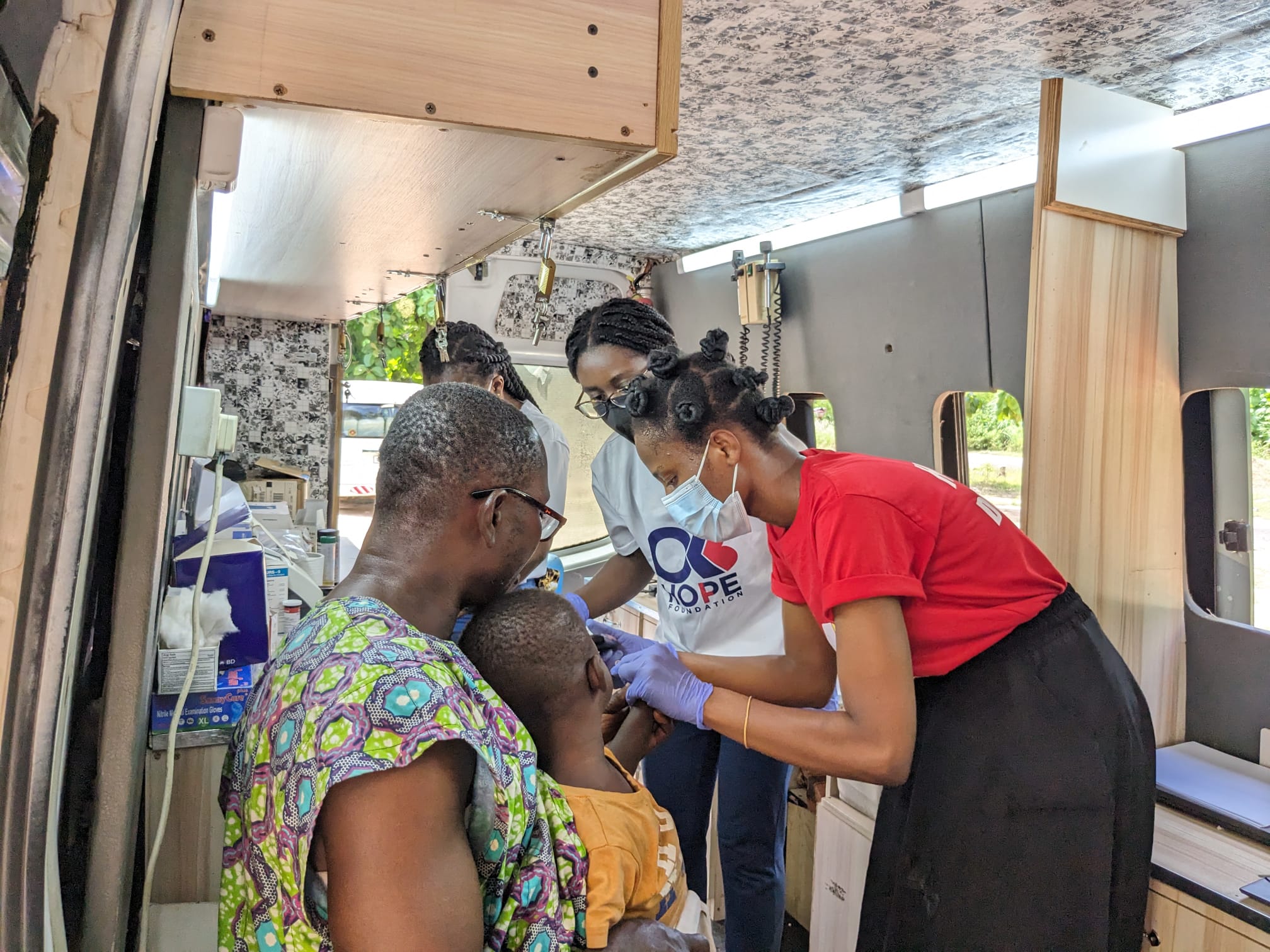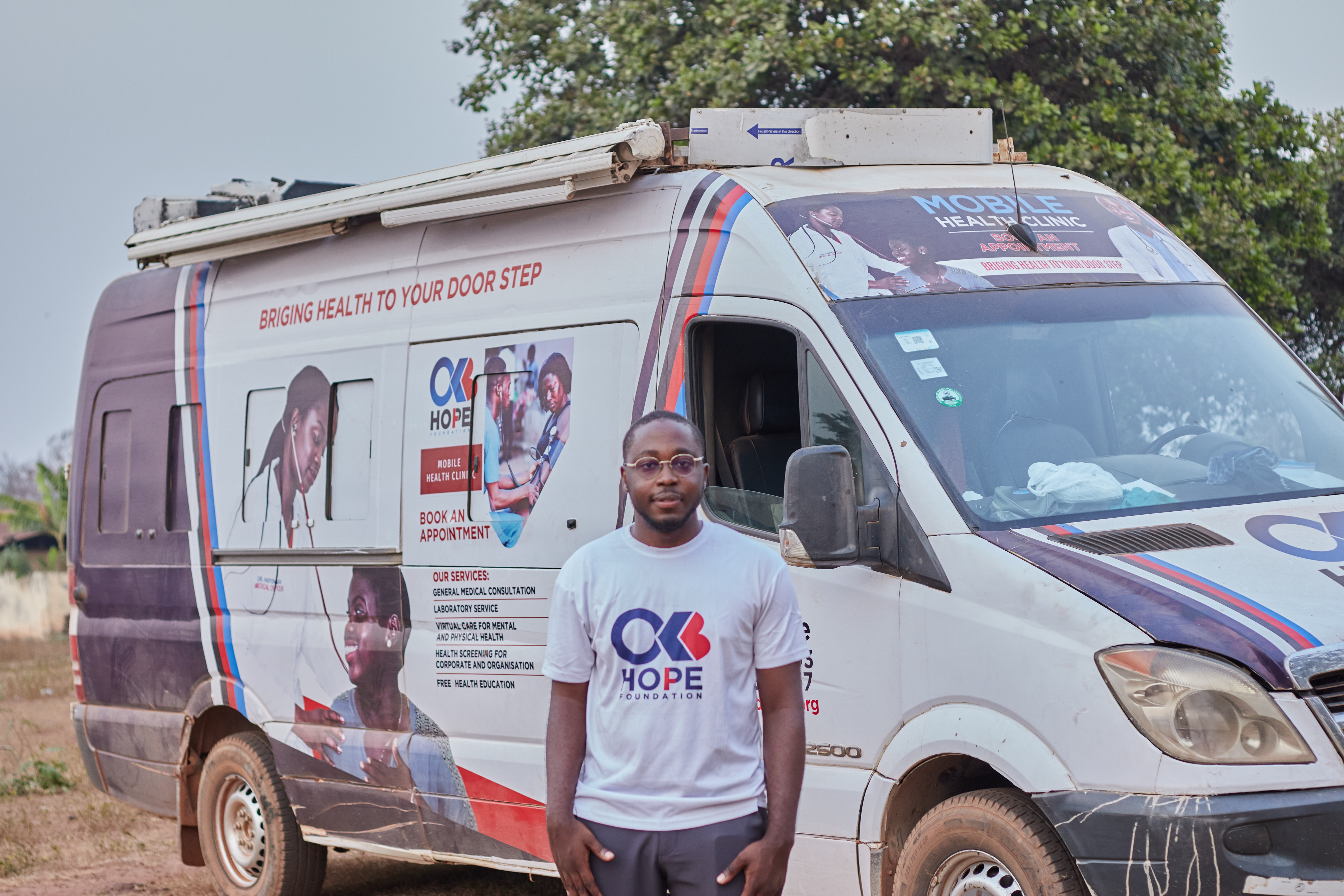World Health Organization
WHA78: Member States highlight the crucial role of the GCM/NCD in driving multisectoral and multistakeholder action on NCDs
Meaningful Engagement of People with Lived Experiences
27 May 2025
World Health Organization | 11 Dec 2024
More than 13.3 million people living in rural areas in Ghana reportedly lack direct access to primary care. Limited healthcare facilities, long distances, and missing transportation options complicate the timely diagnosis and treatment of noncommunicable diseases (NCDs) and their risk factors such as diabetes, hypertension, or cardiovascular diseases. As a result, community awareness for NCD risk factors and health conditions remains low, and people can often only seek care when their health has already deteriorated considerably.
OKB Hope Foundation works to close these persisting gaps in health literacy and access to primary care. Operating a mobile primary healthcare clinic, the project delivers crucial healthcare services to the doorstep of rural communities of the Ashanti region in central Ghana. The mobile clinic is strategically deployed in coordination with local health authorities to address the most pressing access issues, and actively supported by community engagement and improving health literacy across the region. The project also uses an electronic medical record system and digital analytics to map risk factors, assess community needs and plan tailored activities.

OKB Hope Foundation conducting medical outreach in the Wenamda community. Photo: OKB Hope Foundation.
At the heart of OKB Hope Foundation’s project is a customized van equipped with point-of-care diagnostics, medical supplies, and equipment, and a wide range of essential medications for both infectious and non-communicable diseases. Based in the city of Kumasi, this mobile clinic is operated by the project’s experienced team of medical professionals and has reached villages and rural communities across Ghana’s central, western north, eastern, and greater Accra regions.
I believe that everyone deserves access to the best possible care. Through our mobile clinic, we are able to reach individuals with limited or no access to essential preventive services and treatments for both communicable and noncommunicable diseases.
Osei Boateng, Founder, OKB Hope Foundation
Prior to deployment, the OKB Hope Foundation collaborates with local health directorates to identify areas lacking adequate healthcare access. Community surveys and direct interaction with community leaders then allow the team to directly mobilize community members to participate. Once the mobile clinic is on-site, the mobile team conducts health education sessions on preventing and treating prevalent non-communicable diseases. The mobile clinic also offers point-of-care diagnostics including blood glucose and blood pressure monitoring, and testing for multiple infectious diseases such as Malaria, Hepatitis, or HIV/AIDS. The team also provides personalized consultations including through telemedicine services and dispenses essential medications where necessary. Funded through donations, OKB Hope Foundation provides its services free of charge to rural and underserved communities.

Osei Boateng, Founder of OKB Hope Foundation, in front of the mobile clinic at the Abofour community. Photo: OKB Hope Foundation
Since launching the project in February 2022, OKB Hope Foundation’s mobile clinic and community activities delivered primary and preventative care to more than 10’000 individuals across 76 rural communities in Ghana. In four communities, twenty peer advocates were additionally trained to provide health education on preventing and recognizing noncommunicable diseases, reaching close to 1’000 additional community members with their outreach activities. The project’s ambition is to scale-up its mobile services with up to 25 additional vans and new team members across all 16 administrative regions in Ghana within the next three to five years.
A radical shift in global public health is needed to avert millions of preventable and premature deaths from noncommunicable diseases (NCDs), including cancer, diabetes, cardiovascular disease, chronic respiratory disease, as well as mental health conditions. Primary health care (PHC) approaches present an important opportunity to transform and innovate how NCD and mental health services are delivered. For its 4th cycle, the NCD Lab – a WHO platform promoting grassroots innovation for NCD prevention and control – called for innovative solutions that strengthen the delivery of NCD and mental health services using the PHC approach. From the more than 80 projects submitted, five promising innovations were selected to be included in the growing global portfolio of leading NCD innovations and receive tailored support to enhance impact and achieve scale.